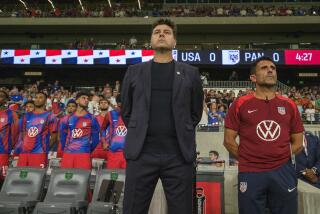Lost Cause for the U.S.
- Share via
LYON, France — When the final whistle sounded Sunday, Ahmad Abadzadeh raced out of the nets, sprinted to the sideline and caught a flag tossed to him by an equally delirious fan.
Then he ran joyfully around the field, Iran’s green, white and red colors streaming proudly behind him.
Iran 2, United States 1.
But what Abadzadeh, the veteran Iranian goalkeeper, should have done was run over and thank the woodwork at the Stade Gerland. If it had not been for the crossbar and the goalposts, that would have been America’s flag being paraded around the stadium.
Instead, the U.S. team is out of the World Cup and Iran lives to fight another day.
Sure, the Americans have a game against Yugoslavia on Thursday in Nantes, but all that will be at stake there is pride.
Blame the woodwork.
Brian McBride, in his World Cup debut, bounced a header off the crossbar. Claudio Reyna slammed a shot into the foot of the right post. David Regis powered a shot that caromed off the left post.
Inches lower, inches to the left, inches to the right and the United States might have won. It’s called finishing, and the American players just could not do it Sunday.
And so they are finished.
But Steve Sampson, their coach, apparently will still be around for a while.
Would he consider stepping down, Sampson was asked in light of the back-to-back losses to Germany and Iran?
“Stepping down? Voluntarily? You’ve got to be kidding,” he said.
“I couldn’t have done anything better tonight. The team was prepared well. The team played well. There’s nothing I would have done differently. It was just a matter of finishing the chances.”
So the man who will decide Sampson’s future was asked the same question. Would Sampson be fired?
“Because of this, no,” Alan Rothenberg said. “What would you have done different? I don’t think he’s to be blamed, and I don’t think the players are to be blamed. It was just one of those things. It wasn’t meant to be, pretty clearly.”
The question came again, phrased slightly differently. This time, the answer from Rothenberg, the president of U.S. Soccer, was slightly different too.
“When the World Cup is over, which obviously for the U.S. is going to be after game against Yugoslavia on Thursday, we’ll start assessing the future,” he said. “I’m not going to do it here and now. It’s not the time to do it.”
Clearly, though, some major rethinking has to be done. The U.S. has lost four World Cup games in a row dating back to 1994, and, until McBride scored a consolation goal late in Sunday’s match, it had gone scoreless in World Cup play for 395 minutes.
That’s more than 6 1/2 hours without being able to put the ball in the net, but Sampson was not dwelling on that fact.
“We did what we set out to do, which was to attack from the very beginning,” he said. “I think we accomplished that goal. Throughout the entire match we played to win. Certainly, we took risks in order to get the win . . . I’m very proud of the players, very proud of the attitude with which they approached the game.”
Once again, Sampson juggled his starting lineup. The most notable absentee was Eric Wynalda, U.S. Soccer’s all-time leading scorer, who did not play. Afterward, Wynalda walked past American reporters in the mixed zone, declining comment.
Wynalda plays for the San Jose Clash in Major League Soccer. Rothenberg is buying the Clash, in conjunction with several partners. So he was asked whether it might not have made sense to at least give Wynalda some playing time in a game in which the U.S. desperately needed a goal.
“I don’t think there’s any problem up front,” Rothenberg said. “Eric obviously did not have a good game against Germany. He’s coming off a long layoff. Clearly, we didn’t do well in the air against Germany, and having McBride in there made a big difference. He gave us some chances up there because of his size, and ultimately it paid off.”
It had paid off long before that for Iran.
Urged on by a vocal crowd that kept up a constant drumbeat of support throughout the match, totally drowning out what little U.S. fan noise there was, the Iranians struck early, late and well.
Their first goal game on a swift move down the right flank, catching the U.S. defense in some disarray. Mehdi Mahdavikia swung the ball out to Javad Zarincheh on the wing and Zarincheh crossed it into the U.S. penalty area, where Hamid Esteli, completely unmarked, rose to head it powerfully into the upper left corner of the American net.
The goal set off a crescendo of noise and the Iranians celebrated as if the game already had been won. In many ways, it had been.
No U.S. player was nearly close enough to defend against Esteli. Reyna, whose task it was, had backed off much too far, allowing the Iranian midfielder essentially an unchallenged shot at goal.
Kasey Keller made a valiant effort to reach the header, flinging himself across the net, but the ball was well out of reach.
The U.S. fought back, but was unable to penetrate a determined Iranian defense. When shots did get through, they were either blocked by Abadzadeh or hit the woodwork.
In the 84th minute, with the U.S. still pressing for the tying goal, Iran doubled its lead.
This time, the goal came on a fast break down the left wing, with Mahdavikia taking the ball on a 30-yard sprint and firing a well-placed shot low to Keller’s left.
The U.S. immediately knew its World Cup was over.
“We knew they were a good team,” Cobi Jones said. “They’re obviously a very good team. We were pummeling away, pummeling away and then it dragged on and we didn’t seem to get the goal. We kept going and going. And then we took one. So it was harder for us to get one back.
“And then you give up a second one. And that’s just like the biggest letdown there is. Knowing that there’s 10 or 15 minutes left and you have to get two goals to tie it and three to win.”
What the Americans got, in the 87th minute, was one.
Preki Radosavljevic, who had come on as a second-half substitute and, like McBride, was making his World Cup debut, spotted McBride unmarked at the far post and crossed the ball to him. McBride sent a strong header downward toward the lower left corner of the net, and the ball just squeezed past defenders Saadavi Naim and Mohammad Khakpour.
That ended a 395-minute scoreless streak. The previous U.S. World Cup goal had been against Colombia at the Rose Bowl four years earlier.
“It’s nice to get a goal, but we came here to win this game,” McBride said. “I don’t think there’s anybody who’s happy with what happened.”
Was there a single factor that brought about the U.S. defeat?
“I don’t think so,” McBride said. “They were opportunistic. They took advantage of the few opportunities they had and they fought. It just wasn’t our day, I guess.”
Or night.
At 3:30 a.m. Monday morning, the drums were still beating in the Place Bellecour in Lyon as Iranian fans celebrated an improbable and lucky--but nonetheless deserved--victory.






